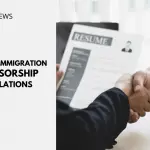What Is a Sponsorship Licence & Why Do You Need One?
Want to hire skilled workers from abroad? You need a Sponsorship Licence! But the application process can be tricky, and mistakes can lead to delays or refusals.
Download our free guide with a step-by-step checklist to ensure your application is approved the first time.
What you need to prepare and what’s in the guide:
- Proof your business is legally operating and financially stable
- HR systems to manage compliance and report to the Home Office
- The right documents (Companies House certificate, bank statements, VAT/PAYE, job descriptions, etc.)
- A strong application that meets Home Office requirements
A sponsorship licence is official permission from the UK Home Office that lets businesses like your's "sponsor" foreign workers under various visa categories. Essentially, it is the required step before a potential employee can apply for a visa (or what you understand as a work permit).
In reality, the Home Office is outsourcing parts of its functions to you. You are then supposed to control and manage any employee that has a permit to stay in the UK by working for you. It’s also a way for you to prove that you’re a legitimate UK employer, capable of hiring and managing international employees responsibly.
These licences serve as a formal permission granted to your business, allowing you to sponsor individuals under the various visa categories available. By securing a sponsorship licence, your business demonstrates your commitment to following the rules and regulations set by the Home Office, which in turn fosters trust and credibility among prospective employees and stakeholders alike.
Your sponsorship licence will be categorised based on the type of work, the skill level required for the positions being offered, and your business needs. The two primary categories are the Worker licence and the Temporary Worker licence. They dictate the types of visas that can be sponsored and the specific requirements that must be met, but be aware that even in the Worker Category, there can be temporary workers. Therefore, you must assess your needs and align them with the appropriate sponsorship licence category to ensure compliance and operational efficiency.
Reminder: Don't forget to download your free ultimate overview guide about Sponsorship Licenses before learning how to prepare for your sponsorship licence.
Key Benefits of a Sponsorship Licence
Securing a sponsorship licence can be a game-changer, unlocking a world of opportunities for growth and expansion. With a licence, you get;
- Access a global talent pool and fill skill gaps
- Strengthen your company’s reputation
- Open doors for business expansion
- Stay ahead in a competitive job market
Without it, hiring non-UK, or settled workers legally isn’t possible. If you intend to only hire British Citizens, employees with Indefinite Leave to Remain (ILR, or what you already understand as Permanent Residency), EU Settlement Status (Permanent or otherwise), students or other staff with "the Right to Work", you will need a Sponsorship Licence. Otherwise, if your business needs to hire international talent to work for you in the UK, you must prepare for a sponsorship licence application.
The bottom line is that, by being able to sponsor foreign workers, you can fill skill gaps and bring in expertise that may not be readily available within the local workforce. This access to international talent can provide a competitive edge, enabling companies to innovate and grow in ways that would otherwise be impossible.
Download Your Free Preparation Guide Now
"*" indicates required fields
Step 1: Check If You’re Eligible
Only legitimate businesses can apply for a sponsorship licence. By inference, it's another way to prove that you are a legitimate company. Before you even start the sponsor licence application, we need to make sure your business meets these key criteria of legitimacy. Are you:
- Legally operating in the UK (registered and compliant with applicable UK laws)?
- Financially stable (bank statements, tax records, and financial documents required)?
- In genuine need for international talent (roles must meet salary & skills thresholds)?
- Maintaining strong HR systems in place to manage compliance and reporting
If not, read no further, unless you are a startup and going through all the above processes to establish your business. If you need help and assistance with the above, reach out to our team.

Pro Tip: The Home Office is likely to conduct a compliance visit before granting your sponsorship licence. Make sure your records, policies, and hiring practices are in order!
In Our Experience: We notice that the Home Office is unlikely to conduct a compliance visit where your organisation is a listed, a PLC, have a strong revenue stream, or are in very remote parts of the country.
Step 2: Gather Your Documents
The documentation stage is crucial. The Home Office will carefully examine your business on paper, so you need to provide strong evidence of your legitimacy.
Essential Documents for Your Application
The documents you will need to submit will depend on your business type and the type of licence you want. Example documents are:
- Business registration (Companies House certificate)
- Bank statements (showing financial health)
- VAT & PAYE registration (if applicable, most businesses will need this in practice)
- Employers' liability insurance certificate
- Job descriptions for sponsored roles
- HR policies and procedures (to prove compliance capabilities)
- Organisation chart
- A letter explaining why you need a Sponsorship licence

If your documents don't meet Home Office standards, your application will be rejected. Double-check everything before submission. We have a Sponsorship Licence Documents Checklist tool and templates to assist you with this process.
Step 3: Complete the Online Application
Once your documents are ready, head over to the Home Office’s online portal to submit your sponsor licence application. You’ll need to:
- Choose the right licence type – Worker or Temporary Worker
- Complete the online application form with accurate details
- Pay the application fee (£536 for small businesses, £1,476 for large businesses)
- Upload & send your documents to the Home Office (usually digitally by email)
Pro Tip: Errors and missing information can cause delays. Have one of our immigration experts review your application before submission!

Step 4: Prepare for the Home Office Review
The Home Office will assess your application, checking:
- Your business legitimacy
- Your financial stability
Your HR systems for compliance
- The genuineness of your need to hire foreign workers
If everything checks out, you’ll receive your sponsorship licence approval and/or get a compliance visit or a request for more information. If you do not respond to requests for further information or comply with a request for a visit, your application will not proceed.

Step 5: Stay Compliant After Approval
Getting your sponsorship licence is just the beginning! You are now taking over part of the Home Office's functions. Therefore, to keep it, you must:
- Keep accurate records of sponsored workers
- Report any employee status changes to the Home Office
- Follow right-to-work checks and prevent illegal employment
- Maintain HR & payroll compliance at all times
Failing to meet these responsibilities can lead to licence suspension or revocation—which means no more hiring foreign talent!
Note: If your Sponsorship licence is revoked, any staff you have hired under the licence will have 60 days to find a new employer or leave the UK.

Common Challenges in Obtaining a Sponsorship Licence
The benefits of getting a sponsorship licence are numerous, but the process itself is not without challenges. One of the most common hurdles your business will face is understanding the complex and changing regulations around sponsorship. The UK immigration landscape is dynamic, it's the one area of legal landscape that changes the most with changes not having to be approved by parliament. Staying ahead of the latest immigration law changes can be daunting for many businesses. Misunderstandings or misinterpretations of these regulations can lead to application rejections or compliance issues down the line.
Another frequent challenge is the preparation of documentation. Getting the necessary paperwork and ensuring it meets the Home Office's standards can be a time-consuming and meticulous process. A lot of businesses find it difficult to compile documents, job descriptions,
policy and process documents that meet the regulatory expectations. For smaller organisations, you may lack the resources or expertise to navigate the intricacies of the application process.
Once granted, you will face compliance requirements.
Finally, a big issue and source of frustration faced is the waiting period for your sponsorship licence application approval. The duration of the review process can vary significantly, and during this time, you will be uncertain about your ability to recruit international talent. This uncertainty can impact operational planning and workforce strategies. Businesses must be prepared to manage these challenges proactively, ensuring you have contingency plans in place while awaiting the outcome of your sponsorship licence application.
The reality of this is that businesses contact us when their employee needs a new visa to work for them. This often involves students on the graduate route or individuals working for another employer. Although there are ways to manage this, it's best to avoid the issue altogether.
Pro Tip: You should start the process, well before you need one, to obtain a sponsorship licence to hire talented staff quickly and efficiently, avoiding visa issues for employees who need to switch employers or visa types.
Preparing for a Sponsorship Licence - Final Tips for Success
Understanding the nuances of the application process, eligibility criteria, and compliance regulations is essential for achieving success. By preparing meticulously and gathering the necessary documentation, you can enhance your chances of obtaining a licence and reaping the associated benefits.
As a final tip, your business should consider establishing an internal compliance team or designating a responsible individual to oversee sponsorship activities. This team, or individual, can then work with our business immigration team to ensure compliance at every stage. This proactive approach can help ensure that your organisation remains compliant with all requirements and can adapt to any changes in regulations. Additionally, fostering a culture of awareness and understanding around sponsorship within the organisation can empower employees to contribute positively to the process.
Ultimately, the journey to securing a sponsorship licence may be complex, but with the right knowledge, resources, and support, your business can unlock a wealth of opportunities for growth and success in the global marketplace. Embrace the process, stay informed, and approach the challenges with confidence, knowing that the rewards of sponsorship are well worth the effort invested.
Hiring an Immigration Lawyer for Sponsorship Licence Applications
Engaging an immigration lawyer can be highly beneficial for your businesses to navigate the sponsorship licence application process. At IaM, we are immigration professionals with specialised knowledge and expertise in immigration laws and can provide valuable guidance throughout the sponsorship licence application. By hiring an immigration advisor, you can ensure that you are adhering to the latest regulations and submitting a robust application that meets all the necessary criteria.
One of the primary advantages of working with us is our ability to streamline the documentation process. We can assist in gathering and organising the required paperwork, ensuring that all submissions are complete and accurate. This support can significantly reduce the risk of errors or omissions that could lead to delays or rejections. Moreover, our advisors can help businesses tailor your applications to highlight your strengths and demonstrate your commitment to compliance.
Our immigration lawyers can provide ongoing support after the sponsorship licence has been granted. We assist businesses with compliance issues, audits, and reporting requirements, ensuring that your business remains in good standing with the Home Office. By leveraging the expertise of our immigration lawyers, your businesses can navigate the complexities of the sponsorship licence process more efficiently and effectively, ultimately setting yourself up for long-term success.

FAQs About Prepare for a Sponsorship Licence
Most applications take 8-16 weeks. The priority service can speed this up to 10 working days.
- Small businesses: £536
- Medium/Large businesses: £1,476
- Certificate of Sponsorship (CoS): £239 per worker
- Immigration Skills Charge: £364 - £1,000 per year (varies by company size)
If rejected, you must fix the issues before reapplying. In some cases, a “cooling-off” period of
6-12 months applies before you can apply again.
Absolutely! At IaM, we specialise in helping businesses navigate the UK sponsor licence application guide smoothly. Our experts ensure your application is flawless, helping you avoid delays and rejections.
- Decades of experience in UK immigration
- Personalised guidance for every client
- Success-driven approach to maximise approval rates
- Ongoing compliance support to maintain your licence
Get Sponsorship Ready with IaM
Preparing for a sponsorship licence doesn’t have to be stressful. Embark on this transformative journey with confidence, knowing that you have the insights and expertise to set the stage for success. We unravel the mysteries of sponsorship licensing and pave the way for your business to flourish in the realm of sponsorship opportunities. If you follow this guide, gather the right documents, and ensure compliance, you can get your licence quickly with less-effort and unlocking Global Opportunities.
Ready to apply? Let IaM handle the heavy lifting so you can focus on growing your business.
Contact us today by scheduling your free Global Talent Unlocking strategy call and let’s get started!











